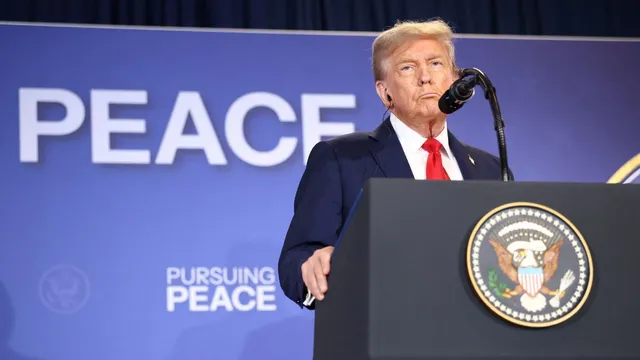- By Supratik Das
- Sun, 17 Aug 2025 11:48 AM (IST)
- Source:JND
US President Donald Trump, after failing to strike a ceasefire deal with his Russian counterpart Vladimir Putin over the Ukraine war at their high-stakes Alaska summit, once again brought up the India-Pakistan conflict, reiterating his claim that Washington played a crucial role in averting a possible nuclear escalation earlier this year.
Speaking to Fox News host Sean Hannity shortly after returning from Anchorage, Trump described the three-hour talks with Putin as “productive” but admitted that “we haven’t quite got there yet” when it came to ending the conflict in Ukraine. While highlighting his self-proclaimed role as a global peace-broker, Trump invoked South Asia to stress that his priority was “to save lives” in conflicts around the world. “Take a look at India and Pakistan. They were shooting down airplanes already. And that would have been maybe nuclear. I was able to get it done,” Trump said, claiming credit for stopping hostilities between the two nuclear-armed neighbours. India, however, has repeatedly denied the assertion, maintaining that the May conflict ended after Pakistan sought a ceasefire following heavy losses.
India's Earlier Response: "No Mediation, No Pressure"
The April 22 Pahalgam terror attack, in which 26 civilians were massacred in Kashmir’s scenic Baisaran valley by Pakistan-linked militants, triggered a massive military retaliation by India. On May 7, Indian forces launched Operation Sindoor, targeting nine terror camps deep inside Pakistan and Pakistan-occupied Kashmir. Pakistan retaliated with drones and missiles, most of which were intercepted by India’s air defence systems. The skirmishes lasted until May 10, when Islamabad reached out to New Delhi with a request for a ceasefire. Despite this timeline, Trump has repeatedly claimed that his intervention and threat of tariffs pushed the two sides towards peace — a version echoed by Pakistan but firmly rejected by India.
Indian officials had already responded to Trump's comments in June and July, dismissing any possibility of a US role in the shutdown of hostilities with Pakistan. Recently in Parliament, Prime Minister Narendra Modi made it clear, "There was no pressure from a third party. The Pakistan DGMO asked for a ceasefire after we had met our goals." External Affairs Minister S. Jaishankar also said in a previous interview with Newsweek that Trump's allegations were not true, "There was no pressure related to trade. I was present during a phone call between Vice President JD Vance and PM Modi. There was no US hint towards a ceasefire." "Perception that trade and ceasefire were connected is just wrong. Diplomacy and defense choices are separate," he added.
On the other hand, White House Press Secretary Karoline Leavitt had supported Trump's claims last month, stating he should win the Nobel Peace Prize for ending several conflicts around the world. "President Trump has ended disputes in India-Pakistan, Congo-Rwanda, Israel-Iran, and more. That's one peace resolution every month," she stated.
Trade Tensions And Strategic Shifts
The Alaska talks also carried major implications for India. Trump hinted at pausing fresh tariffs against China in light of his progress with Putin, but made no such assurance for India. “Because of what happened today, I think I don’t have to think about that now,” he said about potential Chinese penalties, while keeping the door open to review them in the coming weeks.
ALSO READ: 'Trump Was Directly Involved': Rubio Claims 'President Of Peace' Brokered India-Pak Ceasefire
The New Delhi-Washington diplomatic tension has escalated further after Trump levied 25 per cent taxes on Indian products on the pretext of trade deficits and India's continued import of Russian oil and defense equipment. Further straining the relations, Trump recently made a trade and oil development agreement with Pakistan, terming Islamabad's stocks as "massive" and pledging collaboration in the extraction of energy, inducing scathing criticism from Indian strategic communities and Baloch leaders.
While Trump continues to tout his peace-brokering record, India remains firm that its defense and diplomatic decisions are sovereign. The disconnect between the two narratives highlights broader geopolitical tensions, especially in the context of US strategic shifts in South Asia.

